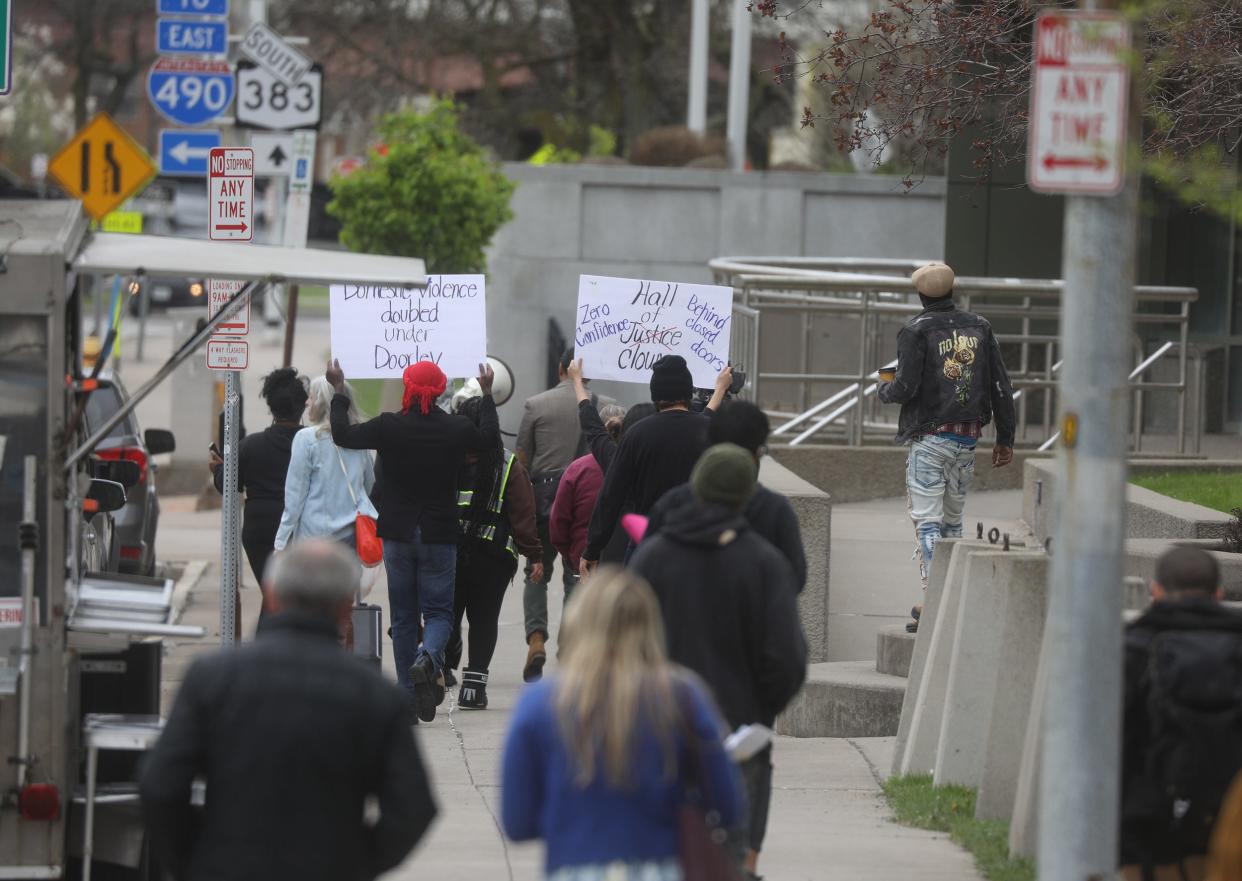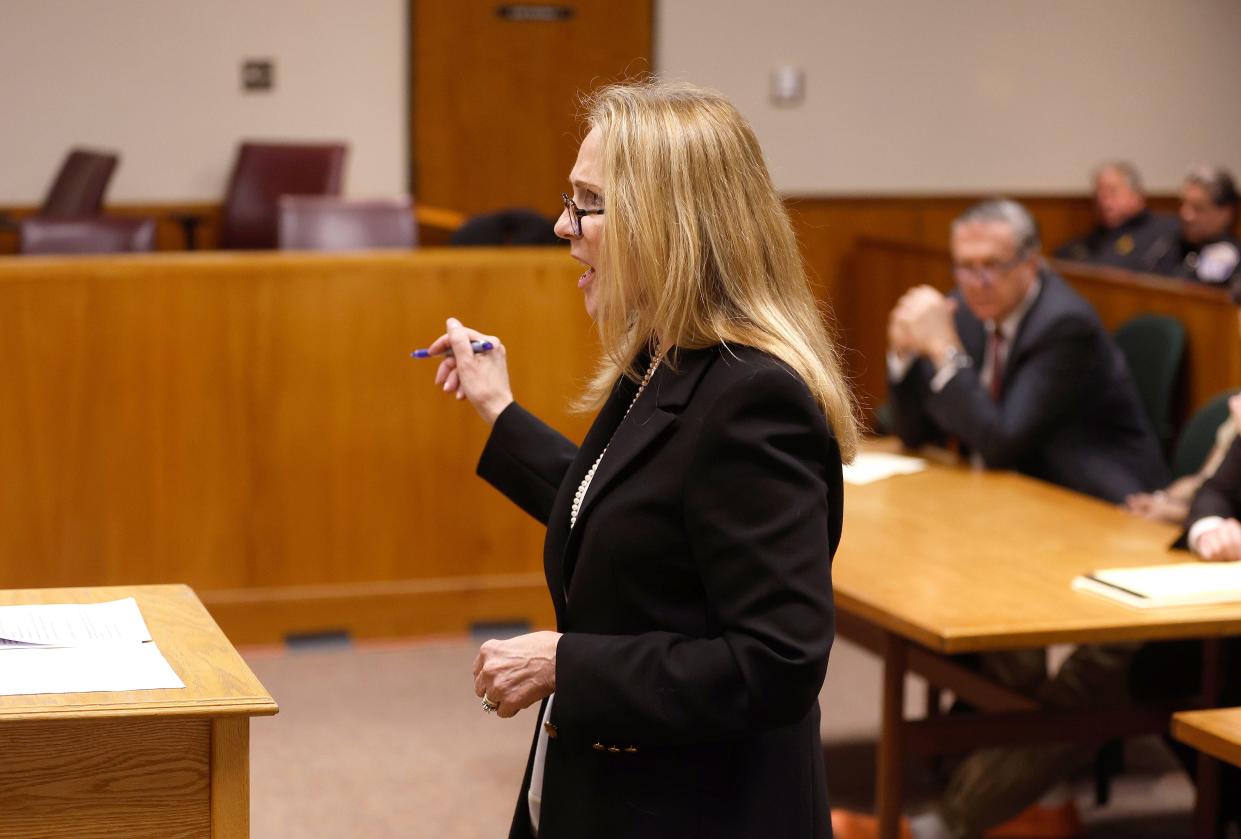Sandra Doorley faces investigations, calls for resignation after traffic incident. Where things stand
Two weeks after Monroe County District Attorney Sandra Doorley's speeding ticket — and the subsequent viral video of her contretemps with a Webster police officer — there are several investigations and continued calls for Doorley's resignation.
Doorley has apologized in a video, an interview with WHEC-TV (Channel 10) and a column in the Democrat and Chronicle. But what will be most important are the continued investigations spurred by her refusal to at first pull over when the officer turned on his lights and siren and her combative attitude toward him when she did stop at her home and he ticketed her.
So what's happening now? Here is a look, with some of the questions that can be answered and some that remain unanswered.
Who all is investigating?
Right now, the state's newly created Commission on Prosecutorial Conduct is expected to investigate, as well as an attorney grievance committee and Monroe County's ethics watchdog entities.
Doorley's office also had the matter referred to the Onondaga District Attorney's Office for review. However, that office determined that the incident was properly before the prosecutor conduct commission.
The Onondaga DA's Office was not acting as a special prosecutor, but instead considering whether there were criminal possibilities that should be explored. Any possible crimes would have still required the choice of a special prosecutor from outside the county.
Is there a criminal investigation?

The ethics-based investigations are probably more significant but questions continue to abound about whether Doorley committed crimes, along with the speeding infraction, and how they would be investigated.
In short, there is no criminal investigation, nor, according to conversations with multiple lawyers in the criminal arena, were there clear-cut crimes with Doorley's actions.
First, Doorley was speeding 20 miles per hour over the limit — 55 miles per hour in a 35-mile-per-hour section — and a crime of fleeing a police officer requires a speed of at least 25 miles per hour over the limit or evidence of reckless driving.
Doorley said she called the Webster police chief from her car to alert him that she planned to pull from Phillips Road, where the officer saw her speeding, into her nearby home. She said she wanted Chief Dennis Kohlmeier to alert the officer, Cameron Crisafulli, that she was not a threat.
Kohlmeier has not discussed the telephone call. He released a statement praising the professionalism of Crisafulli, but the chief did not discuss the call with Doorley in the statement.
"Due to pending investigations, it is inappropriate to comment further," Kohlmeier said in the statement.
Did she illegally "obstruct" the police?
What about the crime of "obstructing governmental administration," a charge often brought against individuals who are alleged to have interfered with an investigation? Critics of local policing say the charge is sometimes used unjustly when an individual is viewed as rude to police in a way that may simply be annoying to the officer.
For instance, over a decade ago local activist Emily Good was accused of the crime when she used her phone to video police questioning a Black man in Rochester. That case, like Doorley's, became national news.
Good was hit with the obstruction charge, as police claimed she interfered with the arrest. Prosecutors later dropped the charge.
The obstruction crime arises if an individual "prevents or attempts to prevent a public servant from performing an official function," and one method, under the law, is by use of "intimidation, physical force or interference."
In the encounter with Crisafulli, Doorley highlighted that she is the district attorney, which could perhaps be a manner of "intimidation." But she ultimately accepted the speeding ticket and has pleaded guilty to the infraction.
Doorley also called the officer an "a--hole." Oddly, only months before, a federal appellate court ruled that the public can criticize police, even with profanities.
In that case, a Buffalo officer charged a man with a noise ordinance violation after the man yelled at the officer, "Turn your lights on, a--hole." The officer had been driving with his lights off and almost hit pedestrians, according to some accounts.
'Horrible enough in itself'
Doorley's guilty plea raises a whole different issue that has been chatter among some lawyers. That issue: With the quick admission to speeding, did Doorley block the possibility of any subsequent charges?
This brings in the legal guarantee against "double jeopardy," namely being prosecuted twice for the same crime. Some have surmised that Doorley, with her guilty plea, managed to stymie any investigation into possible crimes.
Local lawyer Ed Fiandach, known statewide for his defense in alleged drunken driving cases, said there could still be prosecution because the crimes would be "different elements" under the law. The dissimilarities between the speeding offense and possible crimes would be significant enough that other charges could be possible, he said.
Still, Fiandach said, he does not see a crime that is clearly applicable with the incident. He said he, for one, thinks the incident has run its course and Doorley has paid a public price.
"This was one of those things where the event was horrible enough in itself," he said.
The ethical questions

This may be more of a dilemma for Doorley, who reported herself and her conduct to an attorney grievance committee. While upbraiding Crisafulli, she told Crisafulli that, as DA, she would simply prosecute the speeding incident herself.
Doorley will surely say that she had no intent on following up in such a way and that her comments were made in heated jest. And the grievance committee can mete out discipline that includes written admonishments, suspensions, or loss of license.
Meanwhile, Doorley's case will likely be one of the first considered by the state Commission on Prosecutorial Conduct. Gov. Kathy Hochul referred the incident to the commission.
"We all know that prosecutors are the most powerful players in the criminal justice system and they need to be held accountable just as people in other professions are held accountable," said Bill Bastuk, an Irondequoit resident who has fought to ensure the commission is not toothless.
Accused of the rape of a teenage girl, Bastuk was acquitted at a trial 15 years ago during which the honesty of the alleged victim became a central issue. Since his acquittal, Bastuk has worked to fight prosecutorial misconduct and created a nonprofit called "It Could Happen to You."
Bastuk said he can't imagine a scenario where the commission does not find some wrongdoing in Doorley's actions.
"You just can't get away with trying to pull rank on an officer like that by calling the chief and that’s what she clearly was trying to do," he said. "There's got to be some reprimands."
The New York Association of Criminal Defense Lawyers last week called for Doorley's resignation.
"The nature of a District Attorney’s responsibilities is such that fidelity to professional and ethical responsibilities is substantially entrusted to self-monitoring," the association said in a statement. "But when, as here, a District Attorney engages in such patently unethical and unprofessional conduct, there is no longer a basis for public confidence in the District Attorney’s ability to monitor her own conduct.
Possible conflicting ethics cases?
Doorley's case has the potential to become a test not only of the new prosecutorial conduct commission but also of its relationship with attorney grievance committees. Under the law, the commission can recommend punishment, but the grievance committee still determines whether that punishment is proper.
For the commission to have its own power to dole out punishment, voter approval in a constitutional amendment would be necessary.
"If we see a pattern where the grievance committees ignore recommendations for punishment or sanctions or accountability, then we're going to move for the constitutional amendment," Bastuk said.
Doorley could decide to simply let the commission handle the investigation.
"We would love to see Sandra withdraw her request for a grievance committee investigation and leave it to the commission," Bastuk said.
The county's ethics board and Office of Public Integrity are also investigating the incident.
The county's ethics code states that officials "should not use or attempt to use" their official positions "to secure unwarranted privileges or exemptions" for themselves. The ethics board can recommend removal from office by the governor.
(Includes reporting by The Journal News reporter Asher Stockler)
This article originally appeared on Rochester Democrat and Chronicle: Sandra Doorley faces invesigations, calls for resignation. Where things stand
